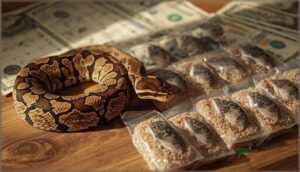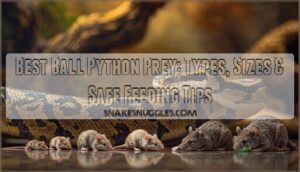This site is supported by our readers. We may earn a commission, at no cost to you, if you purchase through links.
You’ve fallen in love with ball pythons and you’re ready to bring one home—but the price tags might surprise you. A basic ball python could cost you as little as $20, while a rare designer morph might set you back $20,000 or more.
That’s a thousand-fold difference for the same species! The ball python price range depends on genetics, morph rarity, age, sex, and where you buy.
But here’s the good news: understanding these factors helps you find the perfect python within your budget. Whether you’re eyeing an affordable normal morph or saving up for a stunning pied, knowing what drives these prices puts you in control of your purchase decision.
Table Of Contents
- Key Takeaways
- Average Ball Python Prices by Morph Type
- Key Factors That Affect Ball Python Prices
- Where to Buy Ball Pythons and Price Differences
- Initial Setup Costs for Ball Python Ownership
- Monthly and Annual Feeding Expenses
- Ongoing Care and Maintenance Costs
- How to Minimize Ball Python Ownership Costs
- Price Comparison: Popular Ball Python Morphs
- Total Cost of Ball Python Ownership
- Frequently Asked Questions (FAQs)
- What is the price of ball python?
- What is the most sought after ball python?
- Does Petco sell ball pythons?
- How much does a ball python cost?
- How much does an albino ball python cost?
- How much does it cost to feed a ball python?
- How much would a ball python cost?
- Why are ball pythons so cheap?
- How long do ball pythons last?
- How often should I handle my ball python?
- Conclusion
Key Takeaways
- Ball python prices range dramatically from $20 for normal morphs to $20,000+ for rare designer genetics, with common morphs ($65-$150), mid-tier varieties ($200-$600), and designer combos forming distinct price tiers based on genetic rarity and breeding complexity.
- First-year ownership costs $400-$1,200 total, including the snake, enclosure setup ($70-$450), heating equipment ($20-$60), and accessories, while ongoing annual expenses stay remarkably low at $200-$380 for feeding, substrate, and basic veterinary care.
- Smart buyers can slash costs by choosing standard morphs over rare ones, adopting from reptile rescues ($20-$100 vs. breeder prices), purchasing younger pythons, and building DIY enclosures that cut typical terrarium expenses by half or more.
- Ball pythons prove exceptionally cost-effective compared to other pets due to their 20-30 year lifespan, low-maintenance feeding schedule (every 7-14 days), minimal daily care requirements, and predictable long-term expenses that spread initial investments over decades.
Average Ball Python Prices by Morph Type
So, what’s a ball python actually going to cost you? The price swings wildly based on the morph you choose—from everyday patterns you can grab for under $100 to jaw-dropping designer combos that’ll set you back thousands.
If you’re curious about current market rates and what different breeders are charging, the ball python morph marketplace breaks down pricing across hundreds of color variations.
Let’s break down the pricing tiers so you know what to expect when you start shopping.
Common Morphs ($65-$150)
Common morphs like Yellow Belly, Enchi, Fire, Spider, and Banana offer you stunning ball python patterns without breaking the bank. You’ll find these popular pet snake morphs priced between $65 and $150, making them perfect starter options.
Their color genetics remain straightforward, so breeding tips favor consistent results. These morphs combine affordability with visual appeal—ideal for first-time owners exploring ball python cost and snake behavior.
Mid-Tier Morphs ($200-$600)
Ready to step up your collection? Mid-tier morphs like Banana and Albino blend eye-catching color patterns with solid morph genetics, priced between $200 and $600.
Market trends show these ball python morphs hold value well, especially when lineage is documented. You’ll notice distinct pattern shifts and brighter belly coloration—traits that make breeding tips more rewarding.
These snake morphs balance affordability with visual impact, perfect for expanding enthusiasts.
Rare and Designer Morphs ($400-$20,000)
Designer morphs showcase how genetic research and morph breeding transform color patterns into living art—priced from $400 to $20,000.
Multi-gene morphs combine rare ball python morphs with clean lineages, creating unique patterns collectors crave. Ball python prices spike for outstanding snake genetics and proven bloodlines.
You’re investing in snake morphs where market demand shifts fast, so choose breeders with documented breeding history and stable genetics.
Normal/Wild-Type Ball Pythons
Normal or wild-type ball pythons represent the classic form you’ll see in natural ball python habitat across West Africa. They cost $20-$100, making them the most budget-friendly pet snake option. Wild type characteristics include brown and tan blotches—no flashy morphs or python genetics tricks here! Despite lacking designer breeding techniques, these snakes display reliable snake behavior and live just as long as pricier morphs.
- Adult females reach 4+ feet while males stay around 2.5-3.5 feet
- They live 20-30 years with proper care and routine health checks
- Juveniles hatch at 12-18 inches and grow rapidly in year one
- Perfect starter choice before exploring complex ball python morphs
Those interested in learning more about ball python genetic variation will find that even normal ball pythons have fascinating inheritance patterns.
Key Factors That Affect Ball Python Prices
So what makes one ball python cost $75 while another runs you $5,000?
The price tag isn’t random—it comes down to a handful of specific factors that breeders and sellers use to determine value.
Let’s break down exactly what drives these costs so you know what you’re paying for.
Morph Rarity and Genetics
You might wonder why some ball python morphs cost hundreds while others hit five figures—it all boils down to genetic variation and morph inheritance.
Color morphs involving multiple recessive alleles take longer to produce, driving up rarity and price. Trait dominance affects how quickly breeders can stabilize snake genetics through breeding strategies, while allele expression determines how visually striking your ball python morphs will actually look.
Age and Size
Growth patterns directly impact what you’ll pay—hatchlings usually cost less than adults since their size factors haven’t fully developed. Age effects on feeding schedules mean juveniles need frequent meals, growing from 12-18 inches at birth to 24-36 inches in their first year.
Ball python prices climb as maturity stages advance, with established adults measuring 3-4 feet commanding premium rates due to proven genetics and easier ball python care.
Sex (Male Vs. Female)
Your ball python’s sex determination plays a surprisingly big role in pricing. Female ball pythons often cost $50-$150 more than males because of their reproductive biology—they’re the egg-layers breeders need for profitable projects.
Here’s what drives the price gap:
- Female hormones enable clutch production, making them investment-worthy
- Male traits include smaller size, limiting breeding value
- Genetic differences in morphs affect both sexes’ market demand
Breeding History and Bloodline
Think of a bloodline as your python’s family tree—and it matters more than you’d expect. Reputable breeders document pedigree analysis across three generations, proving heritability studies that justify premium prices.
Linebreeding strategies concentrate desirable ball python morphs, while genetic testing verifies claims. Snake breeding with verified bloodline research delivers predictable offspring, so transparent pedigree documentation directly impacts what you’ll pay for quality ball python morphs.
Where to Buy Ball Pythons and Price Differences
Where you buy your ball python makes a bigger difference in price than you might expect.
Breeders, pet stores, online retailers, and rescues all have different pricing structures and trade-offs.
Let’s break down what you can expect from each option so you can find the best fit for your budget and needs.
Breeder Prices
Buying directly from breeders gives you access to the widest selection of ball python morphs for sale at transparent pricing. Here’s what you’ll usually encounter with breeding snake acquisition costs:
- Morph Market and similar platforms host hundreds of breeders showing detailed snake genetics and lineage, making ball python morph pricing super easy to compare.
- Starter projects with single-gene traits (like pastel or spider) run $100–$250, while mid-tier genetics push $200–$600 depending on bloodline quality.
- Designer combos and rare morphs can skyrocket past $1,000 as market trends favor unique patterns and proven breeding lines.
- Live arrival guarantees and overnight shipping typically add $35–$100 to your total breeder fees, though some sellers bundle costs regionally.
For a wider breakdown of, prices can vary substantially based on genetics, age, and available morphs.
Pet Store Costs
Your local pet store usually stocks ball pythons between $100 and $250 for common morphs—that’s retail markups you’ll notice compared to breeders.
But here’s the upside: you can inspect the snake’s health and temperament face-to-face before committing! Some shops even bundle starter kits with enclosures at discounted rates, trimming your initial pet ownership costs while simplifying reptile pet care setup.
Online Retailer Prices
Want convenience? Online reptile marketplaces like exotic reptile marketplace platforms showcase ball python multigene morphs with detailed photos, buyer reviews, and competitive ball python prices—often with retail discounts or price matching policies.
Buying ball pythons online from specialty stores usually includes overnight shipping costs ($35-$85), plus online deals on mid-tier morphs. You’ll find constantly updated inventory at online pet snake stores, with live arrival guarantees when you order within specific regions.
Adoption and Rescue Fees
Looking for a bargain? Reptile rescues and foster care networks often rehome ball pythons for $25-$100 in adoption costs—far less than retail.
These shelter fees usually cover basic vet checks and parasite treatment, making adoption a smart choice. You’re giving a snake a second chance while keeping rehoming fees low, plus many rescues include starter supplies!
Initial Setup Costs for Ball Python Ownership
Before you bring your ball python home, you’ll need to set up a proper habitat—and that means spending some money upfront.
The good news? Most of this equipment lasts for years, so you’re really making a one-time investment. Let’s break down what you’ll actually need to spend on enclosures, heating, hides, and monitoring equipment.
Enclosure and Terrarium Costs ($70-$450)
Your snake enclosure is the biggest upfront expense you’ll face. Plastic reptile tubs run $70-$120 for 20-40 gallon sizes, while glass terrariums with secure locking lids cost $120-$250.
Clear acrylic enclosures climb to $100-$450 due to material costs. DIY enclosure kits offer budget-friendly alternatives at $70-$150 when you include the base, lid, and basic hardware for your ball python setup.
Heating and Lighting Equipment ($10-$50)
After setting up your ball python enclosure, you’ll need reliable heating and lighting equipment to maintain proper temperatures. Ceramic heat emitters cost $12-$25 for 60-watt units, while basking lamps run $8-$30 depending on wattage.
Digital thermostats ($15-$40) give you precise temperature control with energy efficiency and safety features. Clip-on dome fixtures add another $5-$15 to complete your reptile care setup.
Hide Boxes and Accessories ($10-$30)
Your ball python needs at least two hide boxes—one for the warm side and one for the cool side of your snake enclosures. Basic plastic reptile hides start around $10-$15, while textured resin terrarium accessories resembling natural bark run $20-$30.
These pet shelter options help reduce stress by giving your ball python secure retreats that mimic natural hiding caves. Small-to-medium sizes work perfectly for most setups!
Thermometers and Hygrometers
You’ll need both a thermometer and hygrometer to monitor temperature control and humidity sensors in your setup—critical for Ball Python Care and Maintenance. Digital combo units with probe placement cost $15-$25, while wireless models run $30-$50.
Check sensor accuracy regularly and follow calibration methods every few months to guarantee reptile health and wellness in your snake enclosure setup!
Monthly and Annual Feeding Expenses
Feeding your ball python doesn’t have to break the bank. Your snake’s diet consists mainly of frozen-thawed mice and rats, with costs varying based on your python’s age and size.
Let’s break down what you’ll actually spend on food throughout the year.
Feeder Mice and Rats Costs
Your biggest ongoing expense comes down to what you’re dropping on feeder mice and rats. A single pinky mouse runs about $0.08 to $0.25, while frozen bulk trays (50-100 mice) cost $15-$60—a smart move for budgeting.
As your python grows, you’ll switch to rats, which run $0.25 to $1.50 each depending on size and supplier.
Feeding Schedule by Age
Your ball python’s feeding frequency shifts dramatically as it matures through distinct growth stages. Here’s your feeding schedule breakdown for proper snake nutrition:
- Hatchling diet (0-6 months): Feed every 5-7 days with pinky or fuzzy mice to support rapid growth
- Juvenile feeding (6-12 months): Switch to every 7-10 days with larger prey
- Sub-adults (1-3 years): Feed appropriately-sized rats every 10-14 days
- Adults (3+ years): Large rats every 14-21 days maintain healthy weight
Consistent feeding frequency prevents obesity while supporting reptile nutrition and diet needs throughout your snake’s life.
Annual Food Budget ($100-$180)
Your annual ball python feeding budget lands comfortably between $100 and $180, making reptile dietary costs remarkably affordable. Budget planning becomes simple when you buy frozen feeders in bulk—most breeders spend around $5-10 per feeder depending on size.
Food quality matters for proper snake nutrition, but smart feeding strategies like ordering multiple months ahead keep your pet care costs low while maintaining excellent reptile nutrition and diet standards.
Ongoing Care and Maintenance Costs
Once your ball python is settled in, you’ll need to budget for regular maintenance to keep them healthy and comfortable. These ongoing costs are pretty manageable compared to other pets, but they’re still important to plan for.
Let’s break down what you’ll actually spend on substrate, humidity supplies, vet visits, and health products throughout the year.
Substrate Replacement Costs
Your ball python’s substrate isn’t a one-time purchase—you’ll replace it every 2 to 12 months depending on enclosure conditions and material choice. Here’s what affects your ongoing costs:
- Aspen shavings run $10-$20 per bag for basic setups
- Coconut fiber substrates cost $12-$25 and help with humidity control
- Recycled paper bedding ranges from $15-$25 with better odor absorption
- Spot cleaning extends intervals by 20-40%, cutting replacement frequency
- Annual substrate expenses usually require 2-6 bags per reptile enclosure
Annual substrate expenses can add up, but understanding the factors that influence these costs can help you make informed decisions about your pet’s care.
Sphagnum Moss and Humidity Supplies
Maintaining proper humidity means you’ll also budget for sphagnum moss—a humidity control superstar that retains up to twenty times its weight in water. Here’s what you’ll spend:
| Sphagnum Types | Cost Per Package | Replacement Timeline |
|---|---|---|
| Compressed bricks | $8-$15 | 3-6 months |
| Loose moss bags | $10-$20 | 3-6 months |
| Pre-moistened pads | $12-$18 | 2-4 months |
Moss maintenance and humidity monitoring tools (digital hygrometers at $10-$25) complete your reptile husbandry toolkit for ideal snake habitat conditions.
Veterinary Care and Health Checkups
Beyond moss and substrate, you’ll also invest in reptile health and wellness through veterinary exams—usually $50-$100 for routine health screening visits. Most breeders recommend annual checkups to catch snake diseases early, though medical emergencies can run $200-$500+.
Ball python health and medical expenses stay manageable since these reptiles rarely need veterinary care for reptiles if you maintain proper ball python care requirements. Pet insurance? Usually unnecessary for healthy snakes.
Medications and Supplements
Most healthy ball pythons don’t need vitamin supplements or medications—that’s a relief for pet snake breeding enthusiasts! However, if your vet prescribes treatments for parasites or infections, expect $15-$40 per medication. When considering herbal remedies or supplement safety for reptile health, consult your reptile vet first to avoid drug interactions or pharmaceutical effects that could harm your snake.
Three supplement safety tips for ball python health and medical expenses:
- Never give human vitamins—reptile health and wellness requires species-specific formulations
- Ask about drug interactions before mixing prescribed medications with any herbal remedies
- Skip unnecessary supplements unless veterinary care for reptiles confirms a deficiency
How to Minimize Ball Python Ownership Costs
Owning a ball python doesn’t have to drain your wallet if you make a few smart choices from the start. You can cut costs substantially without sacrificing your snake’s health or happiness.
Here are four proven ways to keep your ball python budget under control.
Choose Standard Morphs Over Rare Ones
Want to slash your ball python costs? Choosing standard morphs over rare designer snakes can save you hundreds—even thousands—of dollars.
Common ball python morphs like Yellow Belly or Enchi cost just $65-$150, while rare designer morphs can hit $20,000. Your snake care needs stay identical regardless of morph, so smart pet budgeting means focusing on health and temperament instead of chasing market trends and exclusive breeding.
Adopt or Rescue Instead of Buying
Adoption presents a surprising alternative for cost-conscious reptile pet ownership. While most shelters focus on cats and dogs, specialty reptile rescues do exist—and they offer ball pythons needing homes.
Here’s what rescue benefits look like for exotic pet care:
- Adoption fees are usually $20-$100, drastically lower than breeder prices
- Many rescued ball pythons include enclosures and equipment in the adoption process
- Shelter animals receive health screenings before placement, ensuring pet welfare
- Rescue support often includes care guidance from experienced handlers
- You’re reducing demand for commercial breeding while helping a pet in need
The adoption process for reptiles differs from traditional shelters, but organizations like Reptile Rescue and specialized exotic animal sanctuaries maintain networks across the country.
Buy Younger, Smaller Pythons
Choosing baby ball pythons instead of adults delivers significant cost savings—juveniles under 300 grams usually run $65-$150, depending on morphs. These smaller pets need less enclosure space initially, reducing habitat design expenses.
Plus, you’ll watch their growth rates firsthand while mastering feeding tips and snake handling techniques. Early acquisition also places you perfectly if breeding basics interest you down the road.
Build DIY Enclosures and Accessories
Enclosure design doesn’t demand deep pockets—building your own slashes typical $70-$450 terrarium costs by half or more! Here’s your blueprint:
- Plastic totes with ventilation systems create budget-friendly habitats sized for adult length
- Heat mats paired with thermostats maintain proper heating systems without fancy equipment
- Reptile carpet substrate offers washable, reusable substrate options that last years
- DIY hide boxes from PVC or cardboard provide essential accessories for pennies
Price Comparison: Popular Ball Python Morphs
Now that you know how to save money on your ball python, let’s compare what different morphs actually cost.
Prices vary wildly depending on the genetics you’re after, from budget-friendly starter morphs to stunning high-end varieties.
Here’s a breakdown of popular morphs and what you can expect to pay in 2026.
Yellow Belly and Enchi ($65-$75)
Yellow Belly and Enchi morphs are your most budget-friendly entry points into the ball python hobby. These single-gene color patterns showcase the fascinating world of morph genetics without straining your wallet.
Here’s what you’ll usually pay:
| Morph | Typical Cost |
|---|---|
| Yellow Belly (hatchling) | $65–$85 |
| Enchi (basic pattern) | $75–$150 |
Both morphs display subtle but attractive variations in color patterns and snake behavior, making them perfect starter projects for future breeding tips.
Spider and Banana ($200-$700)
Spider and Banana morphs bring you into the mid-tier price range where color patterns and morph genetics really start to shine. These ball python morphs command higher breeding costs due to their striking visual appeal and versatility in producing designer combos.
Here’s what you’ll pay for these popular snake behavior favorites:
| Morph | Age | Typical Pet Expenses |
|---|---|---|
| Spider Ball Pythons | Hatchling | $200–$350 |
| Spider | Adult | $300–$500 |
| Banana Ball Python | Hatchling | $200–$350 |
| Banana | Juvenile | $350–$500 |
| Banana | Proven Breeder | $500–$700 |
Both morphs offer excellent breeding potential and eye-catching patterns.
Albino and Axanthic ($250-$700)
Albino Ball Pythons and Axanthic Ball Pythons represent standout genetic traits that boost ball python prices into serious territory. These color patterns command higher breeding costs because they’re recessive genes—you’ll need two copies to see the magic!
Here’s what you’ll pay for these stunning ball python morphs:
| Morph | Typical Ball Python Cost |
|---|---|
| Albino | $250–$400 |
| Albino (Premium) | $400–$700 |
| Axanthic | $300–$500 |
| Axanthic (High-Quality) | $500–$700 |
Both morphs offer outstanding pet expenses value and breeding potential.
Pied and Black Eyed Leucistic ($395-$455)
When you’re eyeing gorgeous white snakes, Pied Ball Pythons and Black Eyed Leucistic morphs deliver stunning color patterns that justify their breeding costs. These leucistic traits create eye-catching ball pythons that stand out in any collection.
| Morph | Ball Python Prices |
|---|---|
| Pied | $395–$405 |
| Pied (Premium) | $450–$600 |
| Black Eyed Leucistic | $445–$455 |
| BEL (High-Quality) | $500–$800.” |
Both morphs showcase outstanding morph genetics worth every penny for ball python care enthusiasts.
Total Cost of Ball Python Ownership
So what’s the real damage to your wallet when you bring home a ball python? The truth is, the price tag on the snake itself is just the beginning.
Let’s break down what you’ll actually spend in year one, what to expect long-term, and why these remarkable reptiles are still one of the most budget-friendly exotic pets you can own.
First Year Investment Breakdown
Your first year with a ball python usually runs between $400 and $1,200 total. Ball Python Acquisition Costs start at $65 for common morphs, while Morph Pricing can push designer varieties past $400.
Initial costs include Enclosure Setup ($70-$150), heating equipment ($20-$60), and essential accessories. Don’t forget your Feeding Budget ($100-$180 annually) and Veterinary Care checkups ($40-$100) to guarantee proper Ball Python Care Requirements are met!
Long-Term Annual Costs
After your first year, your Ball Python Care Requirements settle into a predictable rhythm.
Annual Feeding Budgets average $100-$180, while Habitat Maintenance adds another $60-$100 for substrate and cleaning supplies.
Veterinary Expenses run $100-$250 for wellness checks, and you might consider Health Insurance at $10-$25 monthly.
Why Ball Pythons Are Cost-Effective Pets
Beyond those yearly expenses, Ball Python Price Range stands out for genuine Budget Friendly ownership. Low Maintenance feeding every 7-14 days and minimal Snake Care demands keep reptile ownership costs manageable.
Ball pythons prove budget-friendly because feeding every week or two and minimal care demands keep reptile ownership costs remarkably manageable
With 20-30 year Longevity Factors, your initial Ball Python Setup and Accessories spread thin over decades. Compared to high-energy pets requiring daily attention, the CostEffectiveness of Owning a Ball Python makes Reptile Pet Ownership Budget planning refreshingly simple!
Frequently Asked Questions (FAQs)
What is the price of ball python?
Ball python prices vary widely based on morph rarity—you’ll find common morphs for $50-$150, mid-tier options around $200-$600, and rare designer snakes reaching $20,
What is the most sought after ball python?
Blue Eyed Leucistics dominate breeder selection thanks to their pure white bodies and cobalt eyes.
Pied morphs rival that pet demand with bold contrast, while Banana ball pythons capture hearts through vibrant yellow belly coloration and social media appeal.
Does Petco sell ball pythons?
Yes, Petco does sell ball pythons in select store locations, though availability varies by region.
You’ll usually find common morphs priced competitively, but stock changes frequently as animals sell or transfer between stores.
How much does a ball python cost?
Like shopping for gemstones, you’ll find a snake’s price tag reflects its rarity—common morphs start around $65, mid-tier beauties run $200–$600, while designer Ball Python morphs can command up to $20,
How much does an albino ball python cost?
An albino ball python usually costs between $300 and $ The price varies based on lineage, age, and whether you’re buying from breeders or pet stores—premium lines can exceed $1,
How much does it cost to feed a ball python?
Your ball python’s feeding costs usually run $100 to $180 per year.
Budget planning depends on prey options like frozen rodents, meal frequency, and your snake’s age, making dietary costs predictable and affordable.
How much would a ball python cost?
You’ll spend anywhere from $60 to over $20,000 on a ball python, depending on morph rarity, age, and genetics. Common morphs start around $65, while rare designer combos can reach premium collector prices.
Why are ball pythons so cheap?
High breeder competition and abundant snake availability drive down ball python prices.
Market trends show hundreds of thousands in circulation, creating surplus supply.
Common morphs flood expos, making these captive-bred pets remarkably affordable.
How long do ball pythons last?
You’d think buying a cheap pet means a short commitment, right? Wrong.
Ball pythons commonly live 20 to 30 years in captivity—with proper care, humidity, and vet checkups supporting outstanding longevity beyond
How often should I handle my ball python?
You should handle your ball python one to three times weekly in calm environments, keeping sessions brief at five to fifteen minutes.
Skip handling forty-eight hours before and after feeding to help reduce stress and promote healthy digestion.
Conclusion
Choosing a ball python is like picking the right tool for the job—you need one that fits your budget and experience level. Now that you understand the ball python price range from $20 normals to $20,000 designer morphs, you’re equipped to make a smart choice.
Factor in setup costs, ongoing care, and your long-term commitment. With this knowledge, you’ll find the perfect python that brings you joy without breaking the bank.


















